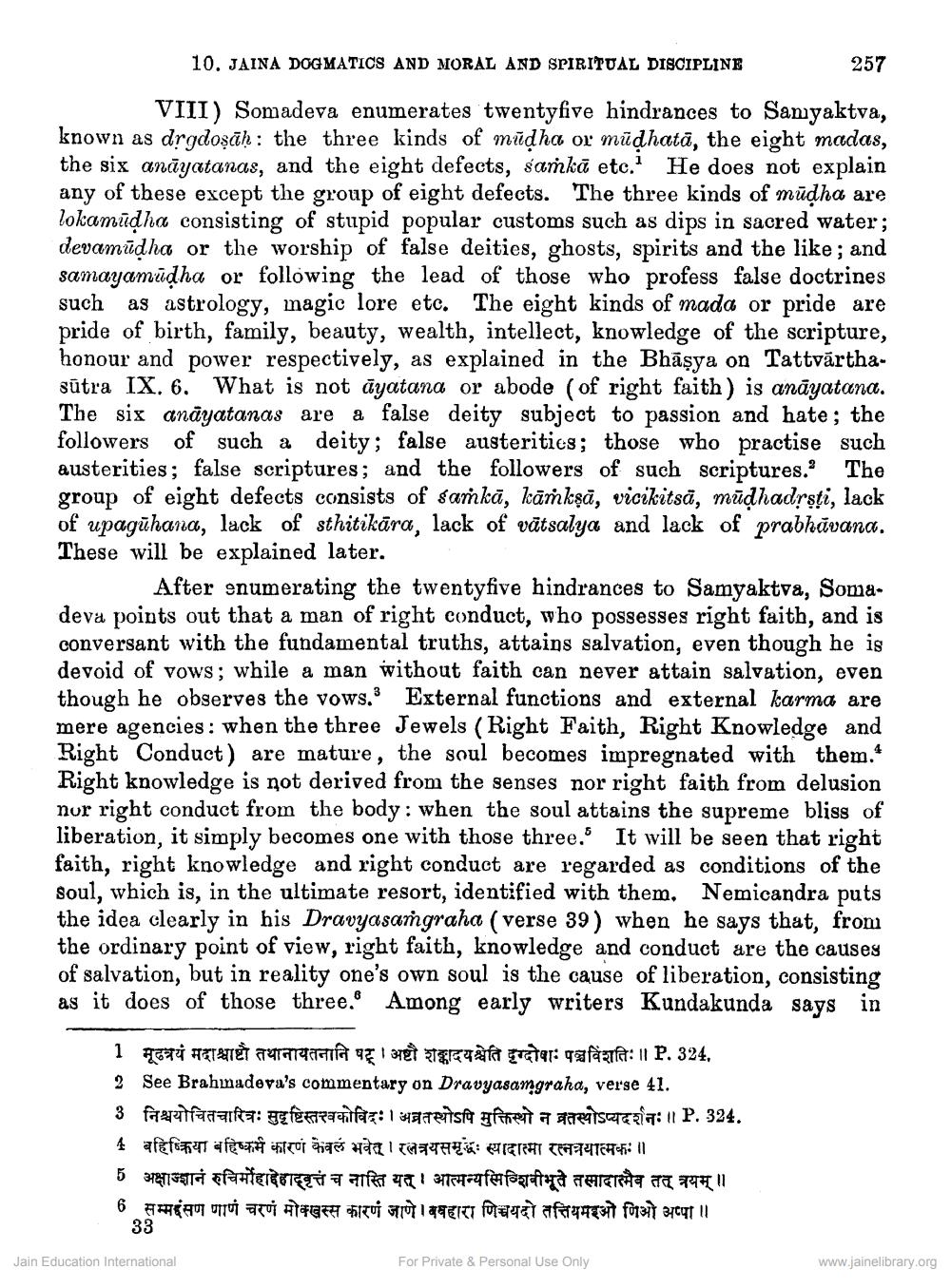________________
10. JAINA DOGMATICS AND MORAL AND SPIRITUAL DISCIPLINE
VIII) Somadeva enumerates twentyfive hindrances to Samyaktva, known as drgdoṣaḥ: the three kinds of muḍha or mūḍhata, the eight madas, the six anayatanas, and the eight defects, samkā etc.1 He does not explain any of these except the group of eight defects. The three kinds of muḍha are lokamuḍha consisting of stupid popular customs such as dips in sacred water; devamuḍha or the worship of false deities, ghosts, spirits and the like; and samayamuḍha or following the lead of those who profess false doctrines such as astrology, magic lore etc. The eight kinds of mada or pride are pride of birth, family, beauty, wealth, intellect, knowledge of the scripture, honour and power respectively, as explained in the Bhasya on Tattvarthasutra IX. 6. What is not ayatana or abode (of right faith) is anayatana. The six anayatanas are a false deity subject to passion and hate; the followers of such a deity; false austerities; those who practise such austerities; false scriptures; and the followers of such scriptures. The group of eight defects consists of saṁkā, kāṁkṣā, vicikitsā, mūḍhadṛṣṭi, lack of upaguhana, lack of sthitikāra, lack of vātsalya and lack of prabhāvana. These will be explained later.
After enumerating the twentyfive hindrances to Samyaktva, Somadeva points out that a man of right conduct, who possesses right faith, and is conversant with the fundamental truths, attains salvation, even though he is devoid of vows; while a man without faith can never attain salvation, even though he observes the vows. External functions and external karma are mere agencies: when the three Jewels (Right Faith, Right Knowledge and Right Conduct) are mature, the soul becomes impregnated with them.* Right knowledge is not derived from the senses nor right faith from delusion nor right conduct from the body: when the soul attains the supreme bliss of liberation, it simply becomes one with those three. It will be seen that right faith, right knowledge and right conduct are regarded as conditions of the soul, which is, in the ultimate resort, identified with them. Nemicandra puts the idea clearly in his Dravyasamgraha (verse 39) when he says that, from the ordinary point of view, right faith, knowledge and conduct are the causes of salvation, but in reality one's own soul is the cause of liberation, consisting as it does of those three. Among early writers Kundakunda says in
1 मूढत्रयं मदाश्चाष्टौ तथानायतनानि षट् । अष्टौ शङ्कादयश्चेति दृग्दोषाः पञ्चविंशतिः । P. 324,
2
See Brahmadeva's commentary on Dravyasamgraha, verse 41.
3 निश्चयोचितचारित्रः सुदृष्टिस्तत्वकोविदः । अव्रतस्थोऽपि मुक्तिस्थो न व्रतस्थोऽप्यदर्शनः । P. 324.
4 बहिष्क्रिया बहिष्कर्म कारणं केवलं भवेत् । रलत्रयसमृद्धः स्यादात्मा रत्नत्रयात्मकः ॥
5 अक्षाज्ज्ञानं रुचिर्मोहाद्देहाद्वृत्तं च नास्ति यत् । आत्मन्यस्मिविशवीभूते तस्मादात्मैव तत् त्रयम् ॥ 6 सम्म सण णाणं चरणं मोक्खस्स कारणं जाणे । बवहारा णिच्चयदो तत्तियमइओ णिओ अप्पा ॥ 33
257
Jain Education International
For Private & Personal Use Only
www.jainelibrary.org




